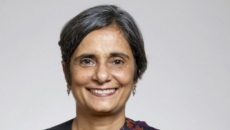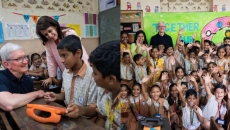Tree-lined alleys, autumn leaves enveloping the ground beneath, underground gatherings resounding with music and singing, a lone woman protester being pushed by the police. But what remains constant in this collage of Iran, is poetry -- haunting and evocative. With words, with silence.
Filmmaker Sreemoyee Singh's documentary 'And, Towards Happy Alleys' screened to a full house during the ongoing Dharamshala International Film Festival (DIFF), one of India's finest festivals, goes beyond the young filmmaker's fascination with Iranian cinema and poet Forugh Farrokhzad, and takes a deep dive into contemporary the Iranian society much divorced from the western gaze at the country.
Created as part of a Ph.D thesis about Iranian new wave cinema, the movie sees the Kolkata-based Singh, who learned Farsi at Tehran University in conversation and singing with master filmmakers like Jafar Panahi and Mohammad Shirvani.
"I am a literature student who fell in love with Iranian poetry, especially by Forugh Farrokhzad, and during my Master's in Cinema Studies, was completely bowled over by Iranian cinema -- wondering how they managed to navigate censorship and tell human stories that are so life-affirming," Singh tells IANS.
Shot in a verite style, the film that has been to around 17 festivals sees the director not just behind the camera and narrating a very personal experience, but never undermining the political, social and human environment of her characters. The filmmaker admits that the inspiring point was Farrokhzad, who died at an early age of 32 years but continues to be a reference point for feminism, someone who dared to write about feminine desire in the 60s.
The director lived in Iran for four years off and on and made a total of five trips to the country.
"I started meeting people and my idea was to spend time with filmmakers like Panahi, who is also the central character in the film, and decipher how someone like him continues to make movies despite a 21-year ban. How does he find ways to tell stories that pain him, realise that reality and translate it to cinema?"
Singh, whose movie premiered at Berlinale, says that through her conversations with filmmakers there, she understood that human resistance reigns supreme even when one is being throttled -- you will still gasp, you will still express.
When she first went to Iran, there was a feeling of deja vu -- the terrain, the atmosphere and the people. During the first week of filming, when a woman asked 'Are you filming me', she decided to change her style. From observational, it became participatory.
"Learning Farsi opened many bridges... I became a part of the film. Considering it is also my personal journey, there is my voice-over and not to mention, the singing I did. For decades, women have not been allowed to sing in public there. My journey there affirmed that one must continue expressing and putting up resistance. We must fight every day to retain our art. This holds true for India too -- for art makes us truly free, thus it is paramount to fiercely protect the space that allows us to express," says the director, who also teaches film studies.
While she did make it a point to call her mother once a day to inform her that she is fine, and Iran is not what many think of it, Singh takes a long hard gaze at the anti-hijab protests, the consequences of living under a totalitarian gaze, the constant vigil of plainclothes police.
However, what is most important is that she finds hope in every frame -- with haunting poetry, clandestine singing and alleys forever wanting to snatch happiness.






